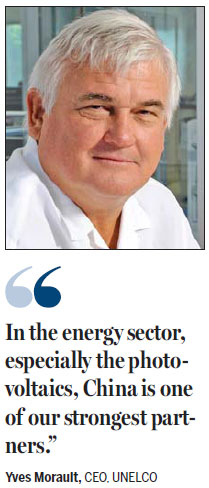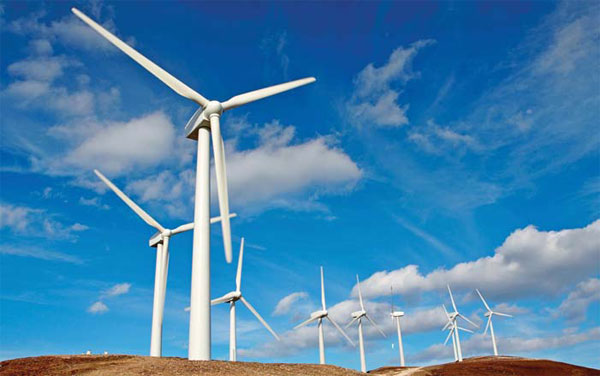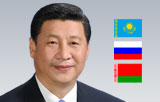Generating power for the nation to grow
(China Daily) Updated: 2015-06-01 07:25Unelco is a forward thinking, technology driven energy company ready for the 21st century
Unelco is a shining example of a company that has limited revenue due to its relatively small customer base, yet through its use of smart and innovative practices and groundbreaking technology is truly a leader, not only in its field of renewable energy solutions, but also in its dialogue with local people.
Thanks to the small size of the population it serves, and the difficulties of supplying power to 65 inhabited islands spread over more than 1,000 kilometers, Unelco has become an expert in supplying small-scale solutions for large-scale challenges.
As one example, a pilot project in Port Orly, on the island of Santo, is leading the way in supplying access to power for remote communities without investing in high-cost infrastructure projects. More than 300 people now have a pre-pay smart system that places them in total control of their energy consumption, allowing them the freedom to join the 21st century while keeping their budget under control.
Yves Morault, CEO of Unelco, sees the future of his company in renewable energies, as it is one area that Vanuatu has world-class resources to utilize. However, investment from outside the country is sorely needed, as well as further technical and technological guidance from third parties, such as the many Chinese investors looking to expand their businesses outside of their homeland.
"In the energy sector, especially in photovoltaics, China is one of the strongest partners we could have," he said. "We are already using Chinese technology, and are always looking for new technologies to fulfill our needs. Chinese standards in hardware, in solar panels and inverters are excellent. We are in contact with companies such as Yingli solar, Jenson and others to supply us. The standard of the Chinese equipment we use is excellent, and the constant technological advancements allow us to store more power, and have a much higher efficiency rate in solar collection and conversion."
This higher rate of collection and conversion also helps the Pacific island nation, as they have an almost limitless supply of sunshine from which to gather energy to power their future growth. However, as Morault explained, "the strength of Vanuatu lies in our resources in renewable energy. There is no oil, no gas, but we have an abundance of sun, good wind and there is huge potential in biomass."
"When I talk about biomass, I am talking about coconut oil fuel, and all types of wood and green waste that can be transformed into electrical energy through different processes such as steam or through the Organic Rankine cycle. Currently, the coverage for electricity is below 20 percent of the population, so our turnover generated by the sale of energy is quite low, meaning renewable energy is very expensive. It is still the method we will follow. We feel very confident that solar is the way forward," he said.
Fossil fuels can cripple the economies of small island nations such as Vanuatu, who often depend on oil and gas imports to fuel their energy needs, thus lowering the governments foreign exchange holdings.
For this reason, Unelco and the Vanuatu government are united in their commitment to ending this dependence on hydrocarbons and driving the economy forward. Despite a population of just 250,000, and the fact that Unelco only has infrastructure access to 125,000, the company is still able to deliver a workable plan for a nationwide green energy supply, as long as the essential funding is forthcoming, as it will play a huge role in the future, even though the eventual goal is to become self sufficient in renewable energy and in the adoption of new technology.
"In 2013, 27 percent of our energy was generated using renewable sources, split between coconut oil, wind and solar," Morault said. "As it stands, solar is becoming more readily available for us, due to reduced costs, and it is economically interesting as we are succeeding with our first operation. This could be very interesting for the Chinese government to take note of.
"We have made an adaptation on our power plant to allow it to run from 100 percent coconut oil, and what we need now is copra (the meat, or kernel of the coconut) to process. We have our own oil mill and plantation, and there is potential here in Efate to supply all of the electricity the island needs with coconut oil. Also, our wind generators were adapted to make them adaptable to cyclone conditions, we are now able to collapse them so they don't get damaged during adverse weather conditions. We are investing in research and development on biomass, starting a pilot plant in Numea that we will then duplicate here if successful."
Unelco's mission is to ensure the uninterrupted supply of electricity to homes and businesses, and also to provide quality service that meets customer's expectations, and allows for the smooth operating requirements of businesses, while also including the establishment of new networks and the strengthening of existing ones so as to keep pace with, and anticipate the development of Vanuatu, which will benefit all aspects of society for the better.
"We are going forward with solar for isolated housing, that being solar on a mini grid with storage, and also hybrid solar where we use both solar and wind or biomass combined. There are a lot of technical solutions for us, but the main problem with small countries is that everything is more expensive. There are opportunities for public private partnerships to build new power plants, but they need to focus on what we as a country needs, not the marketing plan. "
InFocus provided the story

|
Wind farms are the future as Vanuatu builds up its renewable energy sector. Photos Provided to China Daily |
(China Daily 06/01/2015 page6)




